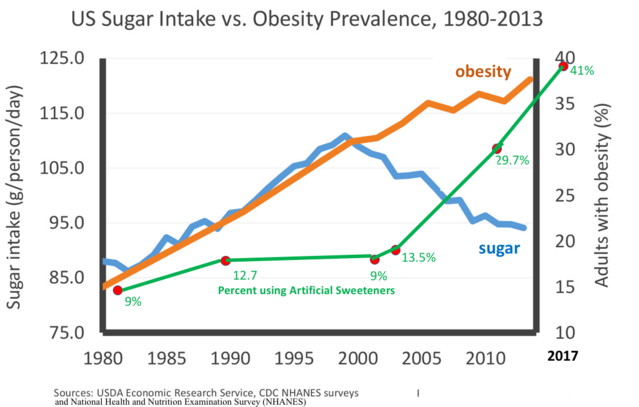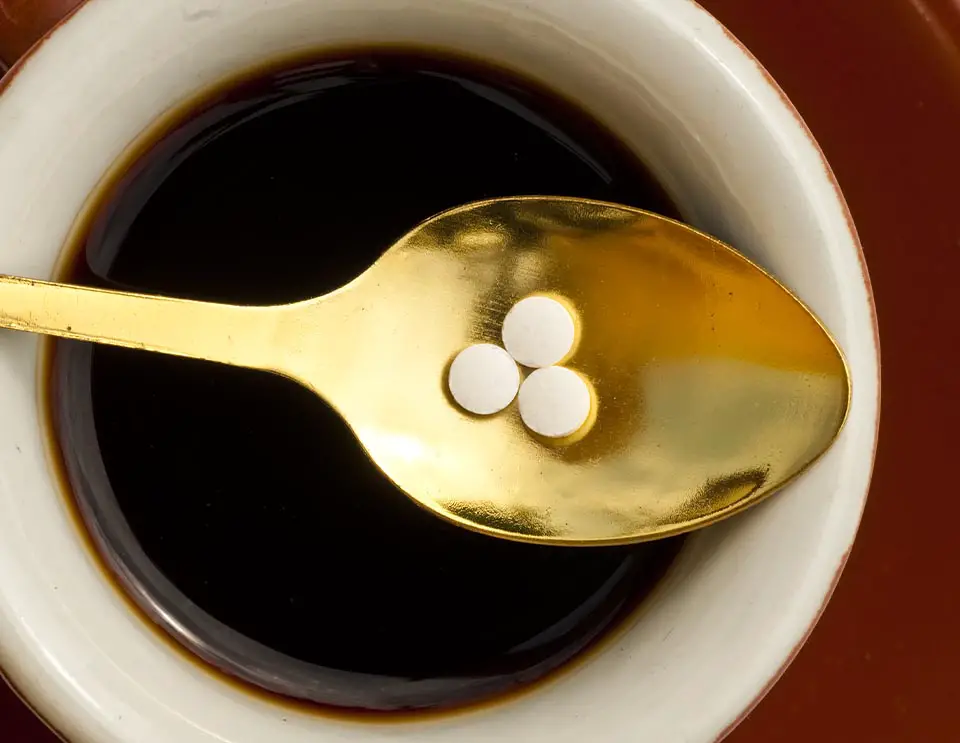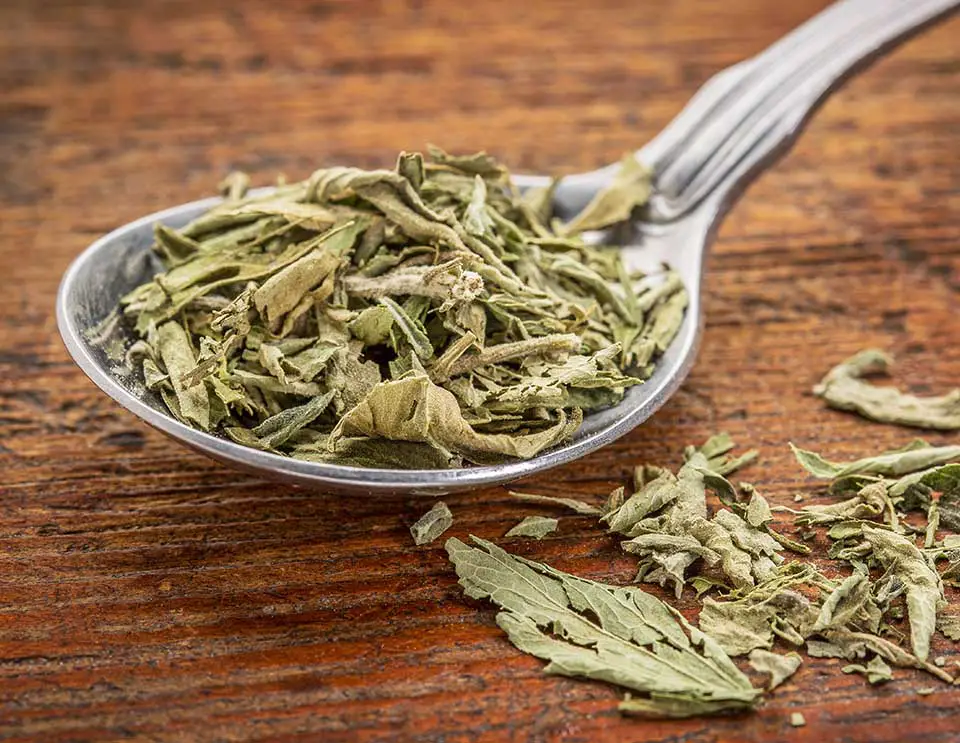When fasting you might ask yourself if it’s OK to add stevia to your coffee, to get some sweetness and facilitate the transition from eating normally to fasting. Artificial sweeteners are advertised as no sugar, no calories. Which is true, most of the time. But is it really a good idea to get artificial sweeteners when fasting?
You can eat most artificial sweeteners when fasting. No study has been able to prove that sweeteners provoke an insulin reaction. No insulin reaction and no calories will mean you’re still in a fasted state. But artificial sweeteners have other ill-effects, it will increase appetite and cravings and can cause severe damage in the long term.
Now, you might think no sugar and no calories mean that diet food is perfectly safe to eat. The problem is, artificial sweeteners are highly processed food, and as always with highly processed food they come with a price.
Let’s dive into the history of artificial sweeteners, the epidemic it created, what effects they could have on a fasting body and the other side effects.
A brief history of artificial sweeteners
The first artificial sweetener, called saccharin, was discovered by Russian chemist Constantin Fahlberg in 1879. It was originally synthesized as an additive to put in drinks, for diabetics. The popularity of saccharin led to other low-calorie sweeteners being discovered.
First, there was cyclamate in 1937 (which was removed from the US market in the 70s because of concerns about bladder cancer) and the big one, Aspartame, was discovered in 1965. The popularity of aspartame launched a whole other bunch of artificial sweeteners like acesulfame potassium or sucralose.
Since the 60s, the rising number of artificial sweeteners naturally lead to diet drinks. These drinks contain very few calories and no sugar. So, replacing a Coke with a Diet Coke and still getting the sweet, sweetness of it, should be a no brainer then?
It certainly looks like it, since today almost 25 percent of American adults ingest artificial sweeteners on a daily basis, mostly in diet drinks.

Since the 60s, diet soda consumption increased by more than 400 percent, Diet Coke is the most popular. But in the last few years, synthesized artificial sweeteners are frown upon more and more, and people are getting informed on the fact that they could lead to health problems.
So, the food industry started to search for more natural low-calorie sweeteners. First came agave nectar, processed from the agave plant, which was found to have a lower glycemic index than sugar. What, at first, seemed like a great discovery, quickly turned out to be a scam: agave nectar had a low glycemic index because it is packed with fructose (around 80%).
Remember, sugar is one molecule of glucose and one molecule of fructose, the latter being the worst of the two. So, agave nectar and its 80% fructose is actually worse than sugar.
Then, along came stevia, which was the next big thing. It’s extracted from leaves of a plant called Stevia rebaudiana. It’s 300 times sweeter than sugar with a very low effect on glucose.
But the takeaway is this, stevia, like sugar, is highly processed. So, in that regard, it’s not better than processed sugar beets turning to table sugar.
What’s worse: in 2012 the American Diabetes Association and the American Heart Association endorsed the use of artificial, low-calorie sweeteners to help losing weight. Based on the fact that they were low in calories and that they could “help curb your cravings for something sweet”. The web page is not accessible anymore, but that what they stated on their website.
All that based on surprisingly few evidence, it could even be argued all the existing evidence leads to the exact opposite. As we’ll see, many studies have been conducted on the subject, most of them with baffling results.
If we had to give one proof that artificial sweetener is not helping weight loss, it would be the fact that diet foods skyrocketed in the last 30 years. So if everyone’s ingesting them, it should have drastically decrease obesity or diabetes during this time? As we all know, it hasn’t.
Do artificial sweeteners break a fast?
That’s a tricky question to answer, there are a lot of studies on the subject of artificial sweeteners, blood sugar, and insulin response. And a lot of conflicting answers on the subject.
First off, if you want to make sure to not break a fast, you shouldn’t use artificial sweeteners. There are lots of conflicting studies on the subject and every sweetener can react in a different way.
But, ultimately, artificial sweeteners are highly processed food, even in the case it wouldn’t break your fast it has been found to have disastrous effects on overall health when consumed frequently. Fasting is not just about losing weight, it’s also a way to detox yourself and to give your body time to rest.
Drinking highly processed crap is not how you should envision fasting. But, hey, that’s just my two cents on the subject, everyone’s different. So, let’s take a look.
Before diving into the many studies on the subject, we could argue that some studies financed by the food industry, would logically try and prove the opposite of an independently founded study. On this specific subject, 83.3% of studies that were sponsored by food companies were unable to show a relationship between artificial sweeteners and weight gain. While independent studies showed the exact opposite.
To be clear on the subject of this chapter, to break your fast aliments would need to increase insulin levels. When the pancreas releases insulin, your body goes out of ketosis and will start using what you ate or drank to use as its primary source of energy, breaking your fast.
Reading many things on the subjects (books, articles, studies excerpt) there seems to be no clear cut evidence that artificial sweeteners would raise insulin levels and blood sugar.
Studies show that they can have an effect on insulin levels. For example, a study conducted on sucralose (which is mostly used in chewing gums, canned fruits, condiments or syrup) in 2013, compared the effect of water before eating carbs to sucralose, on 17 obese insulin-sensitive patients. The study concluded that sucralose increased insulin reaction when coupled with carb-loading when compared to water.
But you’ll agree, that’s a very specific study and patients panels. And that doesn’t mean sucralose actually raises insulin levels.
A more precise and systemic review of the glycemic impact of artificial sweeteners was conducted in 2018 on 741 participants. The study concluded (NNS being Nonnutritive sweetener, aka artificial sweeteners) :
NNS consumption was not found to elevate blood glucose level. Future studies are warranted to assess the health implications of frequent and chronic NNS consumption and elucidate the underlying biological mechanisms.
https://www.ncbi.nlm.nih.gov/pubmed/29760482
So, artificial sweeteners, by themselves, don’t raise blood sugar. They didn’t check insulin levels, but it tends to prove that it wouldn’t create an insulin reaction.
With carbs, artificial sweeteners could increase insulin levels, compared to water intake or even soda (this study talks about it), and they have been found to have a lot more negative impacts on overall health and they actually are a cause of obesity. I’ll talk about that in my next chapter.
But I was unable to find a study indicating a diet coke could break a fast when taken alone. I found even more evidence that it wouldn’t.

This study on aspartame and saccharine states that they didn’t affect peak insulin when eaten with or without food.
Another interesting study was conducted on sucralose. They tried infusing sucralose straight to the gut and this didn’t create an insulin reaction. The idea of the study was to check if artificial sweeteners could activate taste receptors, leading to an insulin reaction. This happened on mice, but apparently not with human patients.
Writing this article, I’m basing a lot of it on the great book by Jason Fung’s: The Obesity Code.
When talking about artificial sweeteners, Fung never says it could break a fast, but he talks about the fact that they spike insulin, even more than table sugar does. But he neglects to mention that these studies where done accompanying carb ingestion.
And when taking a look at his website, he states that you can take artificial sweeteners when fasting, even though it might cause an insulin reaction. But, overall he stays true to his book stating that you should avoid artificial sweeteners in general.
Breaking the fast is one thing and most of the studies conducted on the subject would conclude it doesn’t. But artificial sweeteners may have other undesirable effects on a fasting person. The sweetness could encourage hunger and cravings.
This study talks about the neurobiology of sugar craving and states that artificial sweeteners could increase those cravings significantly. Making it harder for you to fast.
To conclude :
- Artificial sweeteners might not raise insulin. Might not. No study clearly shows that it does, but there are still some doubts and not all sweeteners are created, processed and even combined in the same way.
- Artificial sweeteners can raise hunger and cravings making it harder to maintain a fast. Moreover, in the long term, even though there’s no actual sugar in them, it could promote sweet tooth.
I know, I’m biased. I think artificial sweeteners have too many disadvantages and undesirable effects, fasting or not fasting. But of course, you’re free to experiment and it most certainly won’t kill you.
In the long term though, there are lots of other ill-effects of artificial sweeteners.
Ill-effects and why you shouldn’t use artificial sweeteners
Here are a few of the effects of artificial sweeteners on the long term :
- Increase in risk of vascular events, like strokes or heart attack
- Increase in risk of metabolic syndrome (high blood sugar, high blood pressure, excess visceral fat, etc.)
- Increasing risks of obesity (which is funny, in a way)
A heart study conducted in 2008 on 5158 adults over eight years found that, instead of reducing obesity, diet drinks actually increased the risk. And by a staggering 47 percent. Concluding :
These findings raise the question whether AS use might be fueling–rather than fighting–our escalating obesity epidemic.
https://www.ncbi.nlm.nih.gov/pubmed/18535548
The American Cancer Society also conducted a study, surveying 78 694 women. The hope was that artificial sweeteners were helping prevent obesity and help losing weight. They ended up finding the opposite.
The study showed that, over a one-year period, the women ingesting artificial sweeteners were more likely to gain weight. To measure this conclusion, the weight gain is moderate over a year, not exceeding 2 pounds. But still.
I said earlier that artificial sweeteners increased the risk of vascular events and metabolic syndromes. Here are a few studies on the subject :
- In 2007, this study concluded a 50 percent higher incidence of metabolic syndrome for regular diet soda users
- The 2008 Atherosclerosis Risk in Communities is consistent with the previous study, stating a 34 percent increase incidence of metabolic syndrome in diet drinks users
- In 2012 the University of Miami found that diet soda was associated with a 43 percent higher risk of strokes and heart attacks
- Another study conducted in 2014, following 59 614 women during 8.7 years. They found that drinking two or more diet drinks daily increased risks of cardiovascular events by 30 percent.
Most of this is centered around diet soft drinks, so you might think powder stevia wouldn’t be as bad. But, as I said before, any artificial sweetener can increase cravings.
The brain could perceive a sense of reward from the sweetness, leading to frustration since the food is empty of calories. This study that I already mentioned, talks about the increasing appetite and cravings coming from artificial sweeteners.
Comparing the brain reaction to glucose and sucralose under an MRI study, it was found that the reward’s center was activated fully by glucose. But not by sucralose. Which then could stimulate appetite for sweet food to correctly activate the reward center.
To conclude, yes, reducing sugar is a good thing. Hell, it’s a great thing, it’s the best thing. But replacing it with artificial, chemical ones cannot be considered a good idea. And you might say that some of them are actually natural and not chemical.

But to get powder from a leaf of a plant, there are still many steps to be taken. Meaning it’ll still be highly processed food. You might use organic stevia powder now and then, I’m not saying you’ll die for it. In any case, it won’t be worse than coke.
This situation kind of remind me of a french expression, that, once translated, says this “It equals choosing between the plague and cholera”.
Related questions
Can I chew gum when fasting? Artificially sweetened gum could provoke an insulin reaction, but as with other artificial sweeteners, it would be so small you wouldn’t risk breaking your fast. But it could increase cravings and disrupt the beneficial effects of fasting on the gut bacteria.
Which is the worst artificial sweetener? Aspartame would be the worst, this study shows that it could impair memory and increase oxidative stress in the brain. Then comes sucralose, which is a chlorinated sucrose derivative (chlorine is a highly toxic chemical substance), saccharine, acesulfame K and xylitol. Take a look at this great article describing them in more detail.

